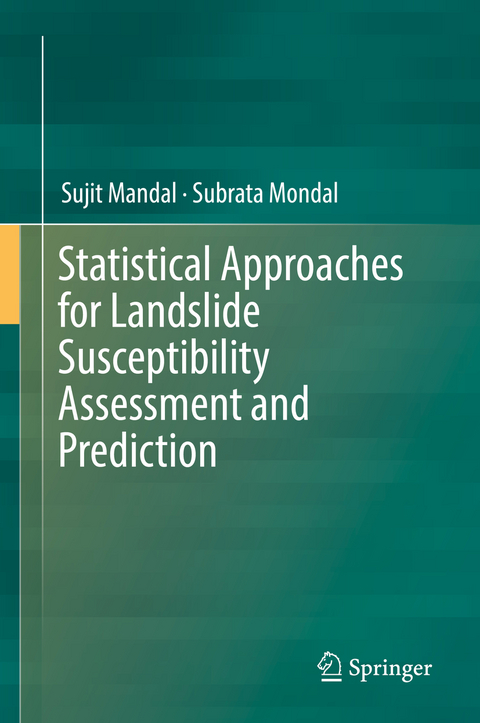
Statistical Approaches for Landslide Susceptibility Assessment and Prediction
Springer International Publishing (Verlag)
978-3-319-93896-7 (ISBN)
This book focuses on the spatial distribution of landslide hazards of the Darjeeling Himalayas. Knowledge driven methods and statistical techniques such as frequency ratio model (FRM), information value model (IVM), logistic regression model (LRM), index overlay model (IOM), certainty factor model (CFM), analytical hierarchy process (AHP), artificial neural network model (ANN), and fuzzy logic have been adopted to identify landslide susceptibility. In addition, a comparison between various statistical models were made using success rate cure (SRC) and it was found that artificial neural network model (ANN), certainty factor model (CFM) and frequency ratio based fuzzy logic approach are the most reliable statistical techniques in the assessment and prediction of landslide susceptibility in the Darjeeling Himalayas. The study identified very high, high, moderate, low and very low landslide susceptibility locations to take site-specific management options as well as to ensure developmental activities in theDarjeeling Himalayas.
Particular attention is given to the assessment of various geomorphic, geotectonic and geohydrologic attributes that help to understand the role of different factors and corresponding classes in landslides, to apply different models, and to monitor and predict landslides. The use of various statistical and physical models to estimate landslide susceptibility is also discussed. The causes, mechanisms and types of landslides and their destructive character are elaborated in the book. Researchers interested in applying statistical tools for hazard zonation purposes will find the book appealing.
Professor Sujit Mandal is a Professor of Geography at Diamond Harbour Women's University, West Bengal, India. He is a former Professor at University of Gour Banga, West Bengal, India, and has been serving in colleges and Universities since 2005. He completed his B.Sc. and M.Sc. from Calcutta University. His Ph.D. thesis was entitled "An analysis of Slope instability in the Shivkhola Watershed of Darjeeling Himalaya: A scientific approach towards the management of land, water and soil". Professor Mandal is specialised in applied geomorphology, environmental hazards and geoinformatics. During his teaching career, Professor Mandal has participated and presented research papers in different National and International seminars/conferences on several aspects of geomorphic processes. He is the author of 40 research articles published from reputed national and international journals. He is the author of the book 'Semi-quantitative approaches for Landslide Susceptibility Assessment and Prediction' published by Springer. He is the principal investigator of one Minor Research Project sponsored by UGC and one Major Research Project sponsored by ICSSR. Mr. Subrata Mondal completed his B.A and M.A. from the University of Gour Banga, West Bengal, India. He is the author of several peer-reviewed research articles in reputable international journals. He is proficient in Geoinformatics and model development. Mr. Mondal completed his M.Phil. degree entitled "Slope instability analysis and delineation of potential landslide susceptibility zones of the Balason river basin in Darjeeling Himalaya, West Bengal" from the University of Gour Banga, West Bengal in 2017. He participated in several national and international seminars and conferences and presented research papers on Landslides in Darjeeling Himalaya.
Concept on Landslides and Landslide Susceptibility.- Geomorphic, Geo-tectonic and Hydrologic Attributes and Landslide Probability.- Frequency Ratio Model (FRM) and Information Value Model (IVM) in landslide susceptibility Assessment and Prediction.- Logistic Regression Model (LRM) and Landslide Susceptibility: A RS & GIS based approach.- Artificial Neural Network (ANN) Model and Landslide Susceptibility.- Weighted Index Overlay Model (WIOM), Certainty factor approach (CFA) and Analytical Hierarchy Process (AHP) in Landslide Susceptibility Studies.- Knowledge driven Statistical Approach for Landslide Susceptibility Assessment using GIS and Fuzzy Logic.- Comparison between Statistical Models: A Review and Evaluation.- Index.
| Erscheinungsdatum | 15.09.2018 |
|---|---|
| Zusatzinfo | XIII, 193 p. 66 illus., 61 illus. in color. |
| Verlagsort | Cham |
| Sprache | englisch |
| Maße | 155 x 235 mm |
| Gewicht | 437 g |
| Themenwelt | Naturwissenschaften ► Biologie ► Ökologie / Naturschutz |
| Naturwissenschaften ► Geowissenschaften ► Geologie | |
| Schlagworte | Analytical Hierarchy Process • Artificial Neural Networks • darjiling himalayas • geomorphic, geo-tectonic and geo-hydrologic attrib • geomorphic, geo-tectonic and geo-hydrologic attributes • Hazard Evaluation • hydrogeology • landslide modeling • Landslide Potentiality Index Value • Landslide Susceptibility Assessment and Prediction • lithology and geomorphology • Logistic multiple regression • monitoring and warning systems • mountain environments |
| ISBN-10 | 3-319-93896-7 / 3319938967 |
| ISBN-13 | 978-3-319-93896-7 / 9783319938967 |
| Zustand | Neuware |
| Haben Sie eine Frage zum Produkt? |
aus dem Bereich


